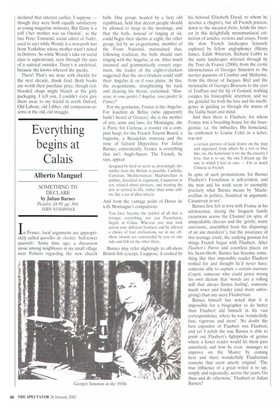Everything begins at Calais
Alberto Manguel
SOMETHING TO DECLARE by Julian Barnes Picador, f8.99, pp. 304, ISBN 0330489I6X In France, local arguments are appropriately called querelles de clocher, 'bell-tower quarrels'. Some time ago, a discussion arose among neighbours in my small village near Poitiers regarding the new church bells. One group, headed by a fiery old republican, held that decent people should be allowed to sleep in the mornings, and that the bells, instead of ringing at six, could begin their alarms at eight; the other group, led by an ex-gendarme, member of the Front National, maintained that, following tradition, the bells should start ringing with the Angelus, at six. After much incensed and grammatically correct argument, the leader of the eight-o'clockers suggested that the six-o'clockers could stuff their Angelus TO oà ii vous plafra. At this, the ex-gendarme, straightening his back and clearing his throat, exclaimed, 'Monsieur, si vous perdez /'Angelus, vous perdez la France!'
For my gendarme. France is the Angelus. For Joachim de Bellay (who apparently hadn't heard of Greece), she is the mother of arts, arms and laws; for Montaigne, she is Paris; for Cocteau, a rooster on a compost heap; for the French Tourist Board, a baguette, a Beaujolais nouveau and the nose of Gerard Depardieu. For Julian Barnes, conveniently, France is everything that isn't Anglo-Saxon. The French, he says, appear
designed by God to seem as provokingly dissimilar from the British as possible. Catholic, Cartesian. Mediterranean; Machiavellian in politics, Jesuitical in argument, Casanovan in sex; relaxed about pleasure, and treating the arts as central to life, rather than some addon, like a set of alloy wheels.
And from the vantage point of Dover he tells Montaigne's compatriots:
You have become the symbol of all that is foreign; everything, not just Frenchness, begins at Calais. Whereas you may look across your different frontiers and be offered a choice of four civilisations, we in our offshore islands are surrounded by you on one side and fish on the other three.
Barnes may refer slightingly to off-shore British fish (except, I suppose, if cooked by his beloved Elizabeth David, to whom he devotes a chapter), but all French poisson, down to the meanest fretin, holds his interest in this delightfully monomaniacal collection of articles, reviews and essays. From the slow French landscapes leisurely explored by fellow anglophones (Henry James, Edith Wharton, Richard Cobb) to the same landscapes whizzed through by the Tour de France (2000), from the erotic idiosyncrasies of Georges Simenon to the sterner passions of Courbet and Mallarme, from the throat of Jacques Brel and the moustache of Georges Brassens to the eyes of Truffaut and the lip of Godard, nothing escapes his francophile attention, and we are grateful for both his love and his intelligence in guiding us through the mazes of the Gallic heart and mind.
And then there is Flaubert, for whom France was a boarding-house for the bourgeoisie, i.e. the imbeciles. His homeland, he confessed to Louise Colet in a letter, was not
a certain portion of land drawn on the map and separated from others by a red or blue line; no, the homeland is for me the country I love, that is to say, the one I dream up, the one in which I feel at ease — I'm as much Chinese as French.
In spite of such protestations, for Barnes Flaubert's Frenchness is self-evident, and the man and his work seem to exemplify precisely what Barnes means by 'Machiavellian in politics, Jesuitical in argument, Casanovan in sex'.
Barnes first fell in love with France in his adolescence, during the frequent family excursions across the Channel (in spite of unspeakable cheeses and the 'gristly, warty saucissons, assembled from the disposings of an axe murderer'), but the assurance of this teenage crush, the undying passion for things French began with Flaubert. After Flaubert's Parrot and countless pieces on his heart-throb, Barnes has become something like that impossible reader Flaubert wished for and thought he'd never have: someone able to capture a certain tournure d'esprit, someone who could prove wrong his own dictum that 'words are a rolling mill that always flatten feeling', someone much wiser and fonder (and more unforgiving) than any mere Flaubertian.
Barnes himself has noted that it is impossible for a biographer to do better than Flaubert did himself in his vast correspondence, where he was 'wonderfully free, vigorous and stern'. No doubt the best expositor of Flaubert was Flaubert, and yet I relish the way Barnes is able to point out Flaubert's lightpricks of genius where a lesser reader would let them pass unnoticed, and how he even manages to improve on the Master by coining here and there wonderfully Flaubertian remarks that seem utterly original. The true influence of a great writer is to say, simply and repeatedly, across the years, Go thou and do otherwise.' Flaubert or Julian Barnes?


















































































 Previous page
Previous page